The flipped english language learning through microsoft team application: analytical post covid-19 pandemic critical study
Abstract
Keywords
Full Text:
PDFReferences
Al-Samarraie, H., Shamsuddin, A., & Alzahrani, A. I. (2020). A flipped classroom model in higher education: a review of the evidence across disciplines. Educational Technology Research and Development, 68(3), 1017–1051.
Andone, D., & Mihaescu, V. (2018). Blending moocs into higher education courses-a case study. 2018 Learning With MOOCS (LWMOOCS), 134–136.
Bond, M. (2020). Facilitating student engagement through the flipped learning approach in K-12: A systematic review. Computers & Education, 151, 103819.
Chen, K., Monrouxe, L., Lu, Y., Jenq, C., Chang, Y., Chang, Y., & Chai, P. Y. (2018). Academic outcomes of flipped classroom learning: a meta‐analysis. Medical Education, 52(9), 910–924.
Cho, H. J., Zhao, K., Lee, C. R., Runshe, D., & Krousgrill, C. (2021). Active learning through flipped classroom in mechanical engineering: improving students’ perception of learning and performance. International Journal of STEM Education, 8(1), 1–13.
Clark, R. M., Kaw, A. K., & Braga Gomes, R. (2022). Adaptive learning: Helpful to the flipped classroom in the online environment of COVID? Computer Applications in Engineering Education, 30(2), 517–531.
Haghighi, H., Jafarigohar, M., Khoshsima, H., & Vahdany, F. (2019). Impact of flipped classroom on EFL learners’ appropriate use of refusal: achievement, participation, perception. Computer Assisted Language Learning, 32(3), 261–293.
Jdaitawi, M. (2020). Does flipped learning promote positive emotions in science education? A comparison between traditional and flipped classroom approaches. Electronic Journal of E-Learning, 18(6), pp516-524.
Jeong, J. S., González-Gómez, D., & Cañada-Cañada, F. (2021). How does a flipped classroom course affect the affective domain toward science course? Interactive Learning Environments, 29(5), 707–719.
JEONG, K.-O. (2017). The use of Moodle to enrich flipped learning for English as a foreign language education. Journal of Theoretical & Applied Information Technology, 95(18).
Jiang, M. Y., Jong, M. S., Lau, W. W., Chai, C., Liu, K. S., & Park, M. (2020). A scoping review on flipped classroom approach in language education: Challenges, implications and an interaction model. Computer Assisted Language Learning, 1–32.
Pal, D., & Vanijja, V. (2020). Perceived usability evaluation of Microsoft Teams as an online learning platform during COVID-19 using system usability scale and technology acceptance model in India. Children and Youth Services Review, 119, 105535.
Pasaribu, T. A., & Wulandari, M. (2021). EFL TEACHER CANDIDATES’ENGAGEMENT IN MOBILE-ASSISTED FLIPPED CLASSROOM. Turkish Online Journal of Distance Education, 22(3), 1–18.
Poston, J., Apostel, S., & Richardson, K. (2020). Using microsoft teams to enhance engagement and learning with any class: It’s fun and easy.
Ranjan, R., López, J., Lal, K., Saxena, S., & Ranjan, S. (2021). Adopting a new hybrid force model: A survey during Covid-19 in Indian higher education. International Journal of Emerging Technologies in Learning (IJET), 16(16), 169–185.
Rehman, R., & Fatima, S. S. (2021). An innovation in Flipped Class Room: A teaching model to facilitate synchronous and asynchronous learning during a pandemic. Pakistan Journal of Medical Sciences, 37(1), 131.
Rodríguez-Rodríguez, C., Vicente-Rodríguez, R., Cortés-Moure, G., & León-Pérez, C. (2019). Personalization of Moodle with the integration of most used web technologies in higher education. Iteckne, 16(1), 48–63.
Singh, M., & Nagwade, O. (2018). Massive Online Open Courses (Moocs) and Its Impact on Management Students. PARIDNYA-The MIBM Research Journal, 6(1), 81–91.
Subramaniam, S. R., & Muniandy, B. (2019). The effect of flipped classroom on students’ engagement. Technology, Knowledge and Learning, 24(3), 355–372.
Tütüncü, N., & Aksu, M. (2018). A systematic review of flipped classroom studies in Turkish education. International Journal of Social Sciences and Education Research, 4(2), 207–229.
Wilson, W. J., Kelly, L. E., & Haegele, J. A. (2019). Least restrictive environment decision making in physical education. Journal of Teaching in Physical Education, 39(4), 536–544.
Xie, Z. (2020). An analysis of the integration and reconstruction of micro-class, MOOC and flipped classroom. Theory and Practice in Language Studies, 10(12), 1571–1575.
Yen, T. V. M., & Nhi, N. T. U. (2021). The practice of online English teaching and learning with microsoft teams: From students’ view. AsiaCALL Online Journal, 12(2), 51–57.
Zainiyati, H. S., Bulan, S., Alhana, R., & Anam, K. (2021). DESIGN FOR LEARNING AL-QUR’AN HADITH MODEL FLIPPED CLASSROOM BASED ON MICROSOFT TEAMS IN MAN IC PASER, INDONESIA. International Journal of Education and Research, 9(1).
Zhao, L., Liu, X., & Su, Y.-S. (2021). The differentiate effect of self-efficacy, motivation, and satisfaction on pre-service teacher students’ learning achievement in a flipped classroom: a case of a modern educational technology course. Sustainability, 13(5), 2888.
Article Metrics
Abstract has been read : 215 timesPDF file viewed/downloaded: 0 times
DOI: http://doi.org/10.25273/etj.v11i1.13562
Refbacks
- There are currently no refbacks.
Copyright (c) 2023 Rizky Eka Prasetya

This work is licensed under a Creative Commons Attribution-NonCommercial-ShareAlike 4.0 International License.
English Teaching Journal: A Journal of English Literature, Language and Education indexed by:
This work is licensed under a Creative Commons Attribution-NonCommercial-ShareAlike 4.0 International License.







